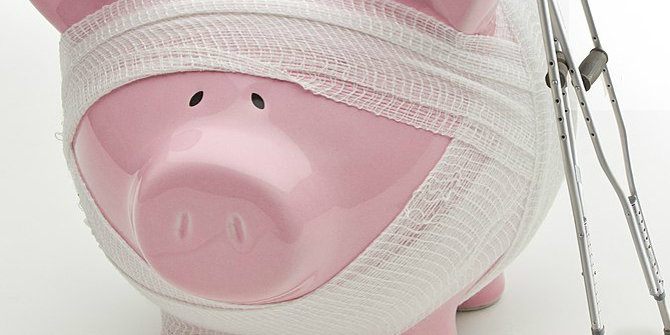 As many as 700 migrants are feared to have died after a boat capsized in the Mediterranean on 19 April. The deaths, which followed around 400 migrants dying in a separate incident less than a week earlier, have led to Italian Prime Minister Matteo Renzi calling for urgent EU action on the issue. Nina Perkowski writes that while the focus will now inevitably be on developing a better search and rescue operation to prevent such incidents from occurring, the only real solution is to provide legal entry routes for refugees from North Africa.
As many as 700 migrants are feared to have died after a boat capsized in the Mediterranean on 19 April. The deaths, which followed around 400 migrants dying in a separate incident less than a week earlier, have led to Italian Prime Minister Matteo Renzi calling for urgent EU action on the issue. Nina Perkowski writes that while the focus will now inevitably be on developing a better search and rescue operation to prevent such incidents from occurring, the only real solution is to provide legal entry routes for refugees from North Africa.
The last week has witnessed almost unfathomable news from the Mediterranean. Within seven days perhaps more than 1,100 individuals have lost their lives while attempting to reach safety in the European Union. The deaths have raised the question of how many more will lose their lives, their hopes, and their loved ones in the Mediterranean before we see political change, and when Europe will finally put an end to policies that have allowed for the deaths of more than 20,000 migrants at Europe’s shores.
A deadly week
Over recent years, many have grown accustomed to recurrent news of migrant deaths at sea, which have become so regular that they might appear as ‘natural’ or ‘inevitable’ occurrences at Europe’s southern and eastern borders. Yet even for those who might ordinarily shrug off news of migrant deaths, this past week has made doing so difficult.

The magnitude of deaths has propelled them back to the front pages of major news outlets across Europe. The stories that are surfacing are clear and painful reminders that European policies in the Mediterranean are set out in a manner that allows people to die, and that indeed, they are leading to unnecessary loss of life. Last October, the Fortress Europe blog had counted at least 21,439 migrant deaths since 1988. Since the beginning of this year alone, we will have to add at least another 1,500.
On 13 April, it emerged that around 400 migrants had died in the Mediterranean, trying to make their way to Europe. Around 24 hours after their departure from Libya, their boat capsized and only 144 of around 550 passengers could be saved. Save the Children commented that many of those who died were children, and the UNHCR warned that 2014, a year of record deaths in the Mediterranean, had seen 30 times fewer deaths in the same period than 2015 thus far. Prospects for this summer – when migrant departures tend to increase due to better conditions at sea – look dire, and it seems clear that we are heading for yet another ‘record’ of migrant deaths at the EU’s borders.
On 16 April, news of another 41 deaths surfaced, as an inflatable boat carrying 45 people from Libya towards Italy capsized on the fourth day of its journey. Four survivors were lucky enough to make it, telling the tale of those who were not. Had they been less fortunate, we might have never known about this incident – just as we will likely never find out about many others.
On the morning of 19 April, an already deadly week reached a sad, new record. In the latest incident, 700 individuals are feared dead after a boat capsized between Libya and Lampedusa: the death toll in this single week crossing the mark of 1,100. Imagine for a second what the reactions to such events might be had the victims been white European citizens or wealthy tourists – remember the Costa Concordia’s 32 deaths in 2012?
The myth of ‘pull’ factors
More than 1,100 individuals died, at sea, in only seven days. While some will undoubtedly blame their deaths on ‘unscrupulous people smugglers’ who ‘lure’ migrants on unseaworthy boats, it is important to keep in mind that smugglers would not be in business if the EU did not keep its doors firmly shut to the poor, persecuted, and disenfranchised, leaving no legal ways for them to reach safety in Europe, and building fences instead of safe passages to EU territory.
Not being able to obtain visas, the only option for many remains crossing borders outside the gaze of ‘our’ border guards, and relying on the ‘services’ of smugglers to avoid controls and find crossing points, boats, or other means of transportation, risking their lives in the process. The EU’s restrictive migration and border policies are the very reasons smugglers have a business in the first place.
Meanwhile, politicians claim that search and rescue operations are ‘pull’ factors encouraging dangerous sea crossings. In the UK, Foreign Office minister Baroness Anelay took this stance last October, explaining that the UK would not support efforts to prevent migrants drowning in the Mediterranean. Similar voices could be heard across Europe, as politicians claimed that Mare Nostrum (the operation run by Italy which has rescued thousands of migrants from the sea) was the reason many migrants tried to reach the EU last year.
Already then, this assertion was dubious: increased mobility also coincided with an intensification of violence in Syria and Iraq, conflicts in the Central African Republic and South Sudan. As a result, the UNHCR identified the existence of a ‘record high’ number of refugees worldwide, going back to World War Two. Simultaneously, the ongoing crisis in Libya weakened border controls there, making it ‘easier’ for migrants to depart, and much less tolerable for them to remain in Libya itself. And while Mare Nostrum undoubtedly saved many from distress at sea, 2014 nevertheless saw 3,072 migrant deaths in the Mediterranean from January to September alone. The suggestion that Mare Nostrum made the crossing to Europe appear ‘safe’ and encouraged more migrants to attempt the journey was far-fetched from the beginning.
And sadly, events since the end of Italy’s Mare Nostrum operation last year have proven such claims tragically wrong. While there are no more large-scale, coordinated search and rescue efforts in place, the sea crossings continue, and deaths have soared. Both migrant arrivals and migrant deaths have been far higher than during last winter, when Mare Nostrum was still operational. If the EU’s strategy is indeed deterrence, as some suggest – scaring others to attempt the crossing by standing by and watching migrants drown – it is not working.
Apart from being an inhumane approach that treats human lives as no more than a means to an end, it is also simply not working. Instead, it is causing the deaths of hundreds and thousands of individuals who see no other choice than to risk their lives during the crossing, hoping that they might be among the lucky ones who survive.
Death in the Mediterranean: time for a solution
When more than 360 individuals died on 3 October 2013 off the coast of Lampedusa, politicians and leaders across Europe expressed grief and shock, and promised urgent change. For those who have observed developments in the Mediterranean since, it has long been apparent that not much has become of these promises. Prospects that the deaths of the last week will change this state of affairs are slim, despite appeals to ‘restart the rescue’ in the Mediterranean, or calls to implement a large-scale European search and rescue operation.
At a time when politicians seem unwilling to change course, initiatives are growing that seek to go beyond these appeals, and that take search and rescue into their own hands. Last year, the privately-run Maltese Migration Offshore Aid Station made headlines as it announced that it would be patrolling the Mediterranean Sea with three boats and two drones, locating and assisting migrants in distress at sea.
This spring, the association announced a cooperation with Médecins Sans Frontières, aiming to conduct a joint search, rescue, and medical aid operation in the Mediterranean. From May onwards, they will be joined by the German Sea Watch project, which will send a boat to patrol parts of the Mediterranean during the summer months, aiming to assist migrants in distress directly and urge the responsible coastguards to come to their rescue.
Since 10 October 2014, a transnational group of activists has been running an Alarm Phone system, advertising a phone number which migrants or concerned relatives and friends can call if a boat is in distress or lost at sea. While the group does not have the means to rescue those in need themselves, they forward calls to the coastguards responsible for search and rescue in the particular area, and follow up with both the coastguards and the boats in distress until it is certain that a rescue is underway. They have been involved in the rescue of thousands of migrants over the last weeks, documenting their and the coastguards’ work, and creating more accountability and transparency around practices of search and rescue at sea in the process.
Following the most recent news on Sunday morning, the Alarm Phone team issued a press release, spelling out the EU’s responsibility for these deaths. Rather than calling for a renewal of Mare Nostrum or a truly European search and rescue effort, they demand the immediate opening of ferry connections for refugees between Tripoli and other North African cities to reach Europe, and the institution of safe and legal ways to access places of sanctuary in the EU.
These demands are important to keep in mind as discussions around search and rescue in the Mediterranean reignite over the following days. While it is vital to institute better mechanisms for search and rescue to avoid the senseless deaths of thousands of individuals, rescue at sea cannot be the sole solution. Only by opening up our doors and offering legal entry routes to Europe can we make dangerous crossings unnecessary, and it is this approach that could lead to the much needed fundamental change at the EU’s borders.
Please read our comments policy before commenting.
Note: This article gives the views of the author, and not the position of EUROPP – European Politics and Policy, nor of the London School of Economics.
Shortened URL for this post: http://bit.ly/1IvhtFb
_________________________________
 Nina Perkowski – University of Edinburgh
Nina Perkowski – University of Edinburgh
Nina Perkowski is a PhD candidate in the School of Social and Political Science at the University of Edinburgh.





The solution is not only to provide safer options for seeking asylum but for engaging in foreign policies that help prevent flight in the first place. There are many ways to do this but the dialogue has not yet been focussing on root causes